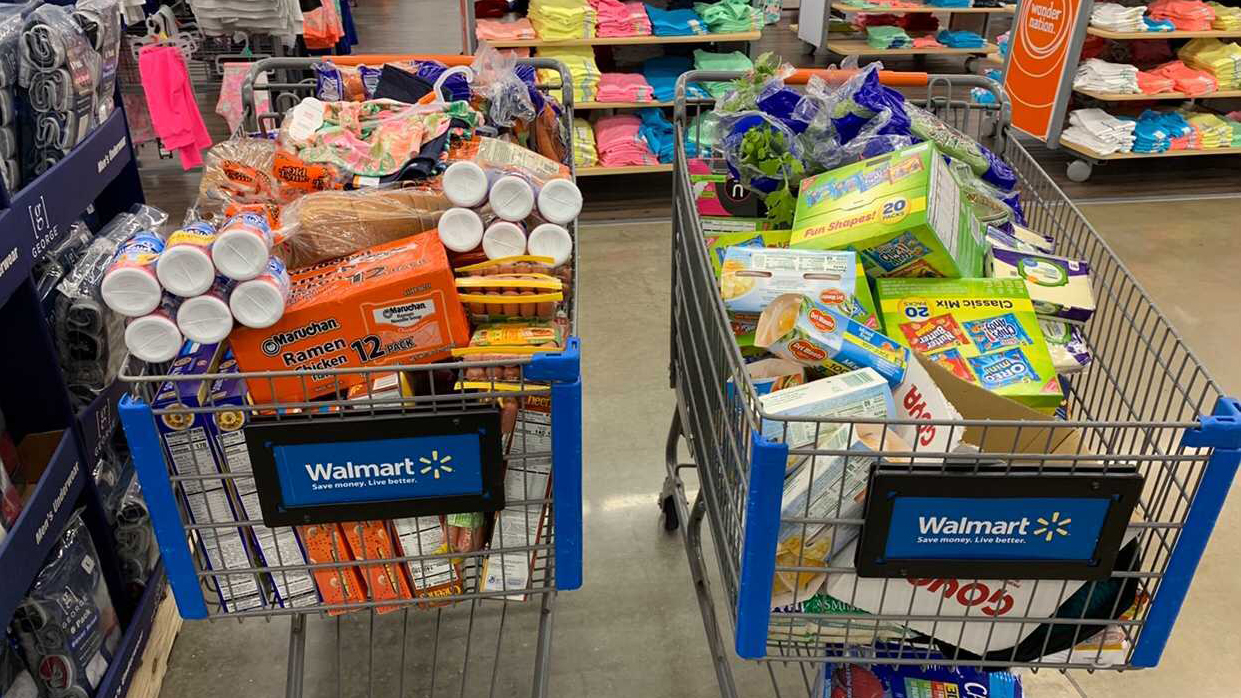Back in April, Oneyda Hernandez was watching television when she spotted someone familiar on the screen.
It was a patient from the chiropractic and physical therapy clinic she worked at. They were being featured in a Univision newsreel about the pandemic’s effects on immigrant families in the area. She immediately texted it to her siblings, who also worked there.
“We were taken aback,” said Hernandez, a former student at the University of Maryland. “We didn’t even know one of our patients was going through such a hard time.”
Throughout the COVID-19 pandemic, immigrant communities have been among the hardest hit. In Prince George’s County, Latinos account for 31 percent of hospitalizations, and across the U.S., Latinos are hospitalized more than four times as often as white, non-Hispanic people, according to the Centers for Disease Control and Prevention.
After hearing her patient’s struggle, Hernandez knew what she needed to do. It was something she knew her mother, Audelia Berrios de Hernandez — who passed away two years ago — would have done. When she was alive, she would provide meals to neighbors in need, Hernandez said.
“It’s just something that she’s instilled in us,” she said. “We wanted to follow in her footsteps.”
So, with the help of her six siblings and a few of her cousins, she delivered essentials to the patient’s family in Langley Park. But after seeing Hernandez’s good deed, other neighbors shared their stories and soon they had requests from more local families asking for assistance.
[Read more: For those raised in College Park’s Lakeland, the wounds left by its destruction remain]
“It touched our hearts, because it’s our community. They just needed a helping hand and most of them aren’t getting the assistance they need from the government due to their status,” Hernandez said.
What has since emerged is the Audelia Community Response Team, a network of volunteers that has delivered groceries and other essentials across Prince George’s County to about 1,300 families. Their goal is primarily to help undocumented families and individuals with resources such as food, personal care items, diapers and even cleaning products.
Since its beginning, the initiative has grown exponentially. To accommodate requests, they’ve expanded to about 30 volunteers split into subcommittees focusing on social media, fundraising, advocacy and resources, said Hernandez, who is now the program’s operations manager. Others work as volunteer drivers to deliver products.
To fund their efforts, they’ve raised about $35,000 through sites like GoFundMe and providing virtual events such as a concert on Instagram Live and ‘Zoomba.’ They’ve put the money toward the boxes of food and other essentials that they deliver to families every two weeks.
And now, they’re trying to raise an additional $50,000 so they can stay a mutual aid group and avoid relying on government funds.
“Our motto, which is ‘el pueblo cuida al pueblo,’ which means ‘the village takes care of the village,’” said Camila Guerrero, a volunteer and alumna of this university. “All of our volunteers are really fueled by the fact that we genuinely care about the community.”
The team works frequently in Langley Park, where many of its residents are undocumented. It’s home to approximately 83 percent Hispanic or Latino residents, and roughly 60 percent of residents are foreign-born. Many of them live in overcrowded apartments and are facing eviction after losing their jobs, Hernandez said.
To make matters worse, those who are undocumented weren’t eligible to receive any of the federal financial assistance available during the pandemic. And although the relief packages provided some funding for community health centers so those individuals can get COVID-19 testing, Langley Park doesn’t have a testing site. Plus, almost 50 percent of its residents under the age of 65 do not have health insurance.
[Read more: UMD, Towson tenants join Maryland delegates at state house in fight to terminate leases]
Volunteer and alumna of this university, Alexandra Melinchok, first got involved as a delivery driver. The lack of a testing site, she said, is just one way Langley Park has been at a disadvantage.
“The community’s needs, in a larger sense, were going unmet for decades,” she said.
That’s where ACRT has tried to help. Alongside their drop-offs, the team is also working with Meduni, a nonprofit health organization, and All Care Urgent Care to establish an accessible coronavirus testing site in Langley Park. They’re hoping to open up the testing site next week in the parking lot of the Takoma Park Preparatory Academy School.
Additionally, they’re also working on collecting school supplies, backpacks, laptops, tablets and other devices to donate to students in need this school year. They’re also looking into having a community fridge, where residents in need could get fresh food, so ACRT can continue to support the community after the pandemic has subsided.
“Knowing that you can take some kind of burden off their shoulders … to put it simply, it makes you feel good,” Guerrero said. “It is our responsibility as community members to give back to our community and take care of it.”
Melinchok agreed. Their help isn’t about charity, she said — it’s about solidarity.
“That need has always been there. Just because the COVID pandemic goes away, doesn’t mean the need is gonna go away,” she said.



